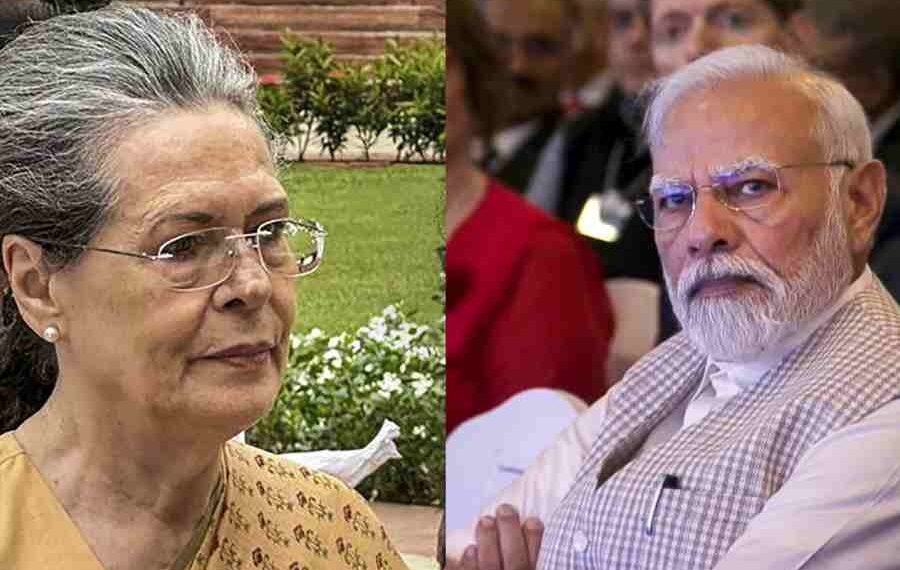Sonia Gandhi urges India to reassert its diplomatic voice amid rising global tensions, warning that silence in the face of Israel’s military actions and Iran’s sovereignty violations will only deepen instability and betray India’s longstanding principles.
BY PC Bureau
Congress Parliamentary Party chairperson Sonia Gandhi has denounced the Modi government’s silence over the escalating crises in Gaza and Iran, describing it as “not just a loss of voice, but a surrender of values.”
Writing in The Hindu under the title “It is still not too late for India’s voice to be heard,” Gandhi accused the government of walking away from India’s historical commitment to a peaceful two-state solution that includes a sovereign Palestine alongside Israel.
She expressed dismay at India’s muted stance during a period she described as one of the worst humanitarian catastrophes in recent memory. “New Delhi’s silence on the devastation in Gaza and now on the unprovoked escalation against Iran reflects a disturbing departure from our moral and diplomatic traditions,” Gandhi wrote.
 READ: Trump for Nobel Peace? Pakistan Pitches the Irony of the Century
READ: Trump for Nobel Peace? Pakistan Pitches the Irony of the Century
She also took aim at U.S. President Donald Trump, whose recent actions in West Asia she said betrayed his earlier promises to end “forever wars.” His endorsement of Israel’s June 13 airstrike on Iran, despite intelligence warnings, marked a return to unilateral militarism, she warned.
“New Delhi’s silence on the devastation in Gaza and now on the unprovoked escalation against Iran reflects a disturbing departure from our moral and diplomatic traditions. This represents not just a loss of voice but also a surrender of values.
It is still not too late. India… pic.twitter.com/uAWjeEPJar
— Priyanka Gandhi Vadra (@priyankagandhi) June 21, 2025
According to Gandhi, the Israeli strike against Iran represented a grave violation of sovereignty and a dangerous escalation with potentially global repercussions. She condemned it as an “unlawful” attack, part of what she called a troubling pattern of Israel’s recent conduct — including its “brutal and disproportionate” military campaign in Gaza.
“These actions,” she wrote, “carried out with little regard for civilian lives or regional stability, will only deepen conflict and prolong instability.”
Gandhi accused Israeli Prime Minister Benjamin Netanyahu of repeatedly choosing escalation over dialogue, alleging that his leadership has consistently undermined peace efforts and fueled extremism.
The Congress leader also pointed out that while India-Israel relations have grown stronger in recent years, so too have India’s historical ties with Iran — a country she described as a longstanding friend. She reminded readers that Iran had stood by India at key moments, including helping block an anti-India resolution on Kashmir at the UN in 1994.
“India is uniquely positioned,” she argued, “with deep diplomatic ties to both Israel and Iran. This gives us a moral responsibility and strategic leverage to play the role of a peace broker.”
Highlighting the risk to Indian citizens across West Asia — many of whom live and work in the region — Gandhi said the government must prioritize peace not just as a moral stance, but as a vital national interest.
While unequivocally condemning the October 7, 2023 Hamas attacks on Israel as “horrific and unacceptable,” Gandhi maintained that Israel’s retaliation has been catastrophic in scale. “More than 55,000 Palestinians have been killed. Entire families, entire neighborhoods — even hospitals — have been wiped off the map. Gaza is on the brink of famine.”
In conclusion, she called on the Indian government to break its silence. “It is still not too late. India must speak out, act responsibly, and use every diplomatic channel to de-escalate the situation and return the region to dialogue and peace.”














